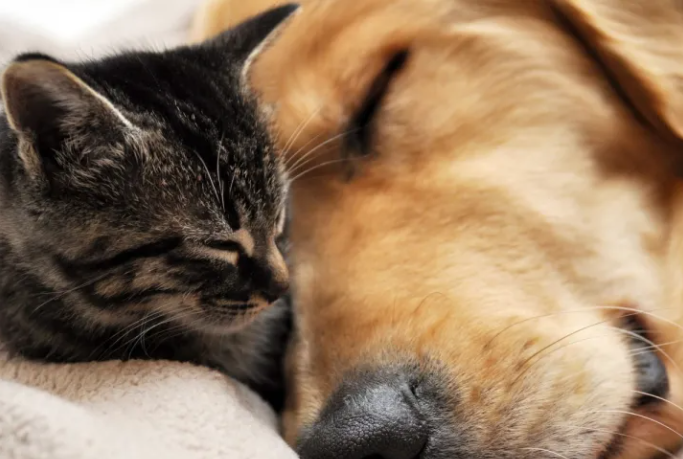How often do you hear your baby coughing and wonder if he’s sick, has a cold, or just clearing his throat? Today, respiratory diseases are divided into two categories: dog and cat to introduce, so that you have a preliminary understanding, so that you no longer worry about the health of your dog and cat!
Common respiratory diseases in dogs
1. CIRDC, canine infectious respiratory disease complex
Canine Infectious Respiratory Disease Syndrome (CIRDC), also known as canine cough and infectious tracheobronchitis, can be caused by a variety of bacteria and viruses. Especially in autumn, the temperature difference
between morning and night is very large. At this time, the respiratory mucosa is stimulated by the continuous alternations of hot and cold, and the bacteria will take the opportunity to invade the dogs with poor resistance.
The symptoms of kennel cough include dry cough, sneezing, increased nasal and eye discharge, and even accompanied by vomiting, loss of appetite, and elevated body temperature.
This disease is related to dogs’ immunity and a clean environment. It can be prevented by reducing dogs’ stress, keeping warm and cleaning and disinfecting the environment regularly. Even if you do get infected, some of
the pathogens can be treated with antibiotics, but there is no single magic bullet.
2.Two, fungal infection
In dogs with low immunity, fungal infections (such as yeast) or other molds may occur. Fortunately, there are common drugs that can effectively treat the fungus.
3. Heartworm
Heartworm is transmitted through the bites of floaters. Adult heartworms can grow in dogs’ hearts, causing problems with circulation and causing symptoms such as asthma and coughing.
Although there are drugs for both larvae and adults, there is a simple and effective way to prevent heartworm infection. A regular dose of heartworm prophylaxis every month can effectively prevent heartworm infection.
However, it should be noted that prophylactic medicine only prevents larvae. If adult worms have appeared, it has no therapeutic effect and must be taken to the animal hospital immediately for treatment.
4. Canine distemper
Canine distemper is caused by paramyxovirus and, in addition to respiratory symptoms, can cause very serious complications such as pneumonia and encephalitis. But a vaccine is already available to prevent the virus.
5. Other factors
Other pathogens and environmental factors, such as family members who smoke, can also affect your dog’s respiratory health.
It is worth mentioning that short-snouted dogs such as Pug, Fado, Shih Tzu, because of the natural short airway, most of the short snouted airway syndrome (Brachycephalic airway syndrome (BAS), because of the smaller
nostrils, soft jaw is too long, resulting in breathing difficulties, easy to breathe, but also because of heat is not easy to heat stroke. However, BAS can only be improved by plastic surgery.
Common respiratory diseases in cats
1. Asthma
Asthma is the most common respiratory condition in cats, affecting about 1 percent of domestic cats in the United States.
Asthma can be caused by pollen, litter, perfume, obesity and stress. If your cat coughs or even breathes with its mouth open, take it to the vet immediately. Asthma can get worse very quickly. Open mouth breathing can be
dangerous for cats. Seek medical attention immediately.
2. Allergies
Allergy causes are similar to asthma, and you can consult your veterinarian to determine what is going on.
3. Heartworm
Most of the time we talk about heartworm in dogs, cats are less susceptible to infection because they’re not its natural host, but usually by the time they show symptoms, they’ve already caused considerable damage and even
sudden death.
The best course of action is to have regular prevention and health check-ups, as dogs do. Unlike dogs, there is currently no treatment for heartworm infection in cats.
4. Others
As with dogs, other factors can affect your cat’s respiratory health, such as systemic diseases such as pneumonia, heart failure, or fungal infections or lung tumors.
So, what can we do to prevent it?
We can clean and disinfect our dogs and cats regularly before they show symptoms, give them good nutrition to strengthen their defenses, get regular vaccinations, and give them preventive medicine (like heartworm
medicine), because prevention is the best cure!If you have the misfortune to develop symptoms, we should pay close attention to:
• A dry or wet cough?
• What time is it? When you wake up, before you go to bed, in the morning or at night?
• What causes respiratory symptoms? Like after a workout or after a meal?
• How does the cough sound? Like a goose crowing or choking?
• When was the last time you took medication?
• Have you taken heartworm medication?
• Do you have any changes in your daily routine?
Through the above observation and pay more attention, it will be very helpful for the diagnosis of veterinary doctors, so that the family pet can recover as soon as possible, no longer affected by disturbing cough happy life ~
Post time: Dec-06-2022



